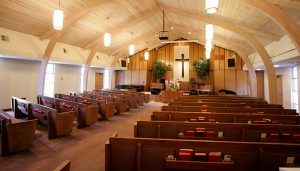By Aaron Earls
Baptist Press
 NASHVILLE — When traveling to church, most people have company, but a significant number say they make the trip alone.
NASHVILLE — When traveling to church, most people have company, but a significant number say they make the trip alone.
A new study from Nashville-based LifeWay Research found 1 in 5 Protestant churchgoers (19 percent) say they typically travel to church alone.
Most travel to church with their spouse (54 percent), while close to a third say their child or children ride with them (31 percent).
Fewer say they typically travel to church with another family member besides their parent or grandparent (18 percent) or a friend or acquaintance (11 percent).
A small percentage say they travel with a grandchild (4 percent) or someone from their church who lacks transportation (3 percent).
“Many weeks, it’s hard enough for attendees to get themselves to church, so it’s not surprising few are stopping to pick up a neighbor,” said Scott McConnell, executive director of LifeWay Research.
“The reality is, if every Christian driving or riding to church this week used the extra vehicle seats around them to bring other people, churches would likely not be able to contain the crowds.”
Men (64 percent) are more likely than women (46 percent) to say they travel to church with their spouse, which indicates wives are more likely to go to church without their husbands than vice versa.
Women (36 percent) are also more likely than men (24 percent) to say their children travel with them to church.
African American churchgoers are the least likely to say they travel to church with their spouse (31 percent) but are more likely than white churchgoers to say they go to church with their children (40 percent to 24 percent).
African Americans (16 percent) are also twice as likely as white churchgoers (8 percent) to say they travel to church with a friend.
Younger churchgoers (22 percent) are the most likely to say they typically go to church with a friend.
Protestant churchgoers 50 and older (23 percent) are more likely than those 18 to 34 (13 percent) to say they attend church alone.
Childhood church trips
For three-fourths of current Protestant churchgoers (76 percent), a parent typically took them to church as a child.
One in 5 (20 percent) say they went with a grandparent, while 1 in 10 (10 percent) say it was another family member.
Few churchgoers say they went alone (6 percent), with a family friend their age (5 percent), rode a church bus (5 percent), or went with someone they knew primarily from church (4 percent).
Among those regular church attenders today, 6 percent say they did not typically attend church as a child.
“The legacy of grandparents taking their grandkids to church has been impressive,” said McConnell. “Yet today far fewer churchgoers are taking grandkids with them — even when looking only at older attendees.”
African Americans are more likely to say they were taken to church as a child by a grandparent (32 percent) or another family member (20 percent).
Regular Protestant church attenders in the West (11 percent) are more likely to say they typically did not attend church as a child than those in the South (4 percent).
Methodology:
The online survey of 1,002 American Protestant churchgoers was conducted September 20-27, 2019 using a national pre-recruited panel. Respondents were screened to include those who identified as Protestant/non-denominational and attend religious services at least once a month.
Quotas and slight weights were used to balance gender, age, region, ethnicity and education to more accurately reflect the population. The completed sample is 1,002 surveys. The sample provides 95 percent confidence that the sampling error from the panel does not exceed plus or minus 3.2 percent. Margins of error are higher in sub-groups.
For more information, visit LifeWayResearch.com or download the full report. B&R
